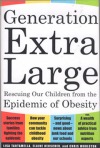Ok – let’s state the obvious. We’re too big. Really – we’re too big. Way too big. For example, the average person riding mass transit now weighs 200 pounds – up from 164 pounds just a couple of decades ago. We’re too big!
Or, to put it another way: When Dandy Don Meredith was the Dallas Cowboys quarterback, the average American weighed 166 pounds. Today, the average American weighs 196 pounds (191 in 2002. The average mass transit passenger is heavier, 200 pounds, because the level of poverty for these riders is higher than the average population). By the way, the average lineman in the NFL is now 48 pounds heavier since the early 1970s – with the average offensive lineman in the 2010 season weighing in at 312 pounds.
(Read many specific figures, from the CDC, here).
Why are we so big? Because we eat more than we need. The more we eat, the more we weigh (it’s not rocket science).
And this is a big, big “we’re too big” problem. We ought to at least know a little more about it, don’t you think?
 So, read these excerpts from this book: Generation Extra Large: Rescuing our Children from the Epidemic of Obesity by Lisa Tartamella, Elaine Herscher, and Chris Woolston. This is the selection I am presenting for today’s Urban Engagement Book Club, which matters to the folks at CitySquare (formerly Central Dallas Ministries) because obesity is exacerbated by poverty. (CitySquare exists to fight the root causes of poverty by partnering with those in need).
So, read these excerpts from this book: Generation Extra Large: Rescuing our Children from the Epidemic of Obesity by Lisa Tartamella, Elaine Herscher, and Chris Woolston. This is the selection I am presenting for today’s Urban Engagement Book Club, which matters to the folks at CitySquare (formerly Central Dallas Ministries) because obesity is exacerbated by poverty. (CitySquare exists to fight the root causes of poverty by partnering with those in need).
Sometimes important changes have a way of sneaking up on you. One afternoon you’re at a busy airport, and you realize that a third of the people waiting for a plane will have trouble fitting into a regular seat.
In just one school, Gina Castro (Texas school administrator) finds eight fourth graders who weigh more than 200 pounds, “My God, we had five-year-olds who weighted 100 pounds.” “Twenty years ago you didn’t have a lot of obese kids, and then gradually it was more and more. Then, after a while, I could look down my blacktop with one hundred kids in line, and thirty of them were obese. I’m not saying just a little overweight. I mean obese.”
It is worth wondering what would have happened if Castro had found eight fourth graders in one school with leukemia. For starters, we’d all have heard about it. Teams of epidemiologists would have come barreling into town to study the outbreak. Medical specialists would have begun treating the children and would have reported daily on their condition. Reporters would be locked in combat to be the first to describe just who these nine-year-olds are, how they live, and how they are coping with their heartbreaking disease.
But no busloads of scientists or reporters are sprinting to any of these kids’ front doors. It’s just another day in the fourth grade.
One of the most disquieting things about obesity is how quickly and accomodatingly we’ve settled into it, towing our kids along with us. In as little as twenty years we’ve eaten our way into the record books. Americans now rank among the fattest people on earth. Two thirds of us weigh more that we should… The country’s issue with weight caused some 400,000 adult deaths in 2000, according to the Center for Disease Control and Prevention (CDC), and obesity is poised to overtake tobacco as the leading cause of preventable deaths, possibly as soon as 2005.
The U. S. food industry produces 3,800 calories a day for every man, woman, and child in the United States (says Marion Nestle, New York University nutritionist and author of Food Politics). Women need approximately 2,200 calories, men approximately 2,500 calories. Food manufacturers can’t sell all those extra calories without increasing portions and seducing people to eat more… “There’s something about human psychology – if a lot of food is put in front of us, we eat it.
Clearly, people are responsible for what they eat, but they can’t be held accountable for keeping a level playing field between themselves and the food industry.
Did you read that figure? – 3800 calories per day. It’s an old problem, and I am defenseless in is presence– put me in line at a buffet, and I will eat more than I need to, more than I should, more than is good for me. And if there is a dessert bar – it’s all over. I eat a little (ok – more than a little) of everything. Everything!
So – we’re too big. We’ve got our work cut out for us.
(Personal note: I’m really glad I lost a fair amount of weight these last couple of months before I read this book. If I hadn’t, I would have been so depressed that I would have headed straight for the Golden Corral).
